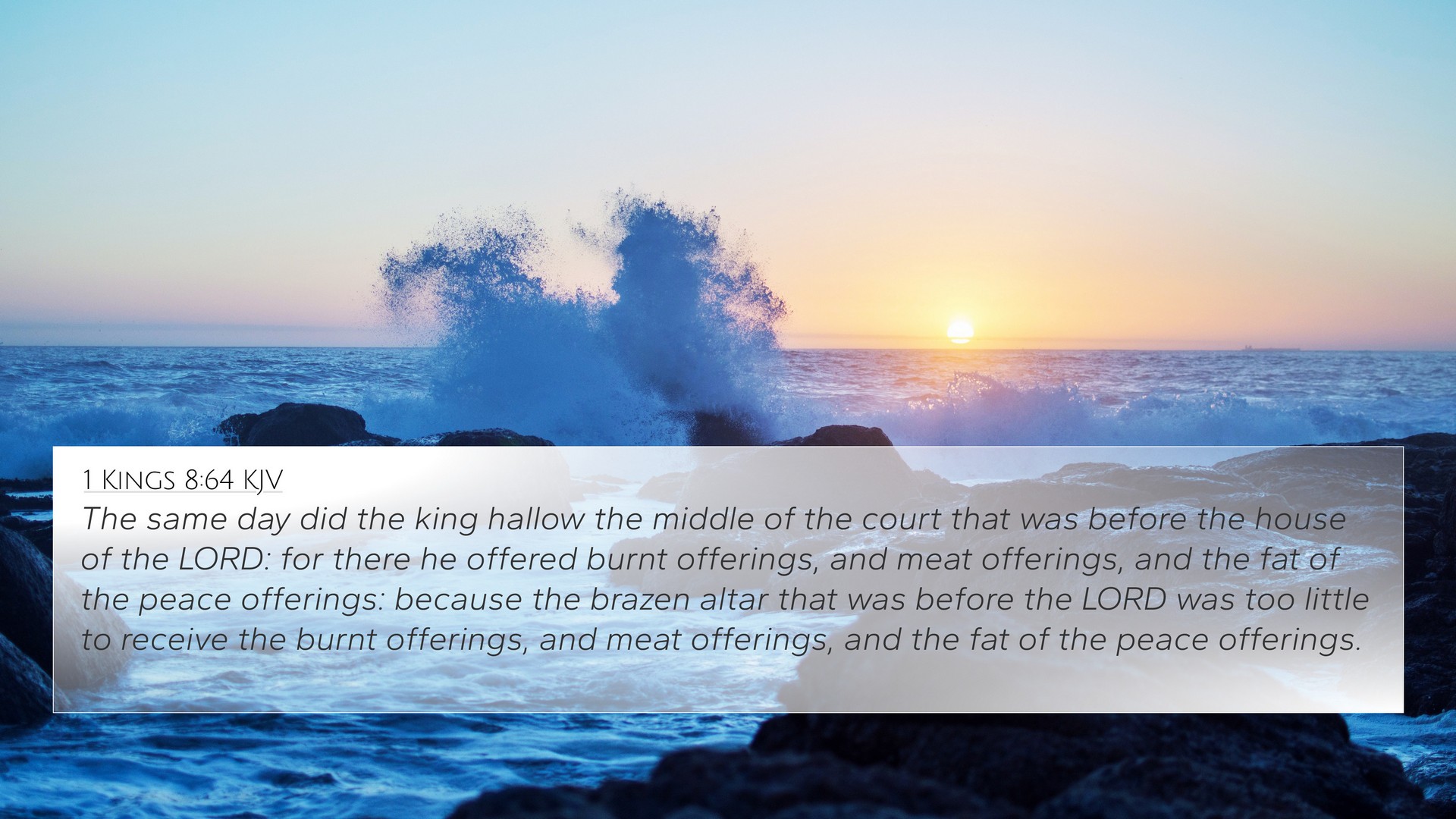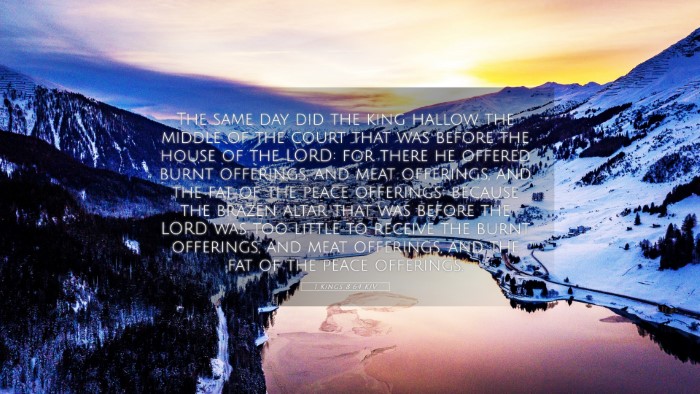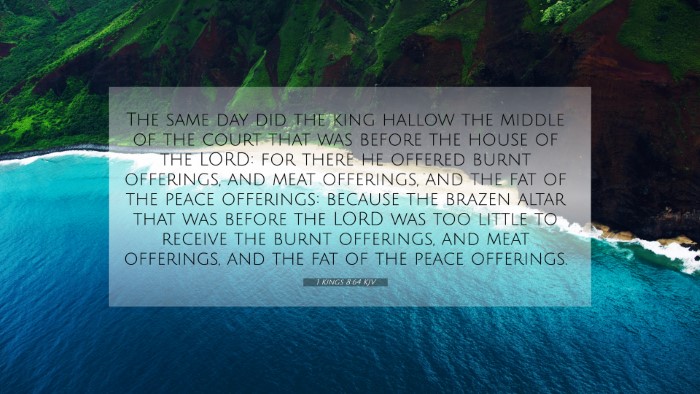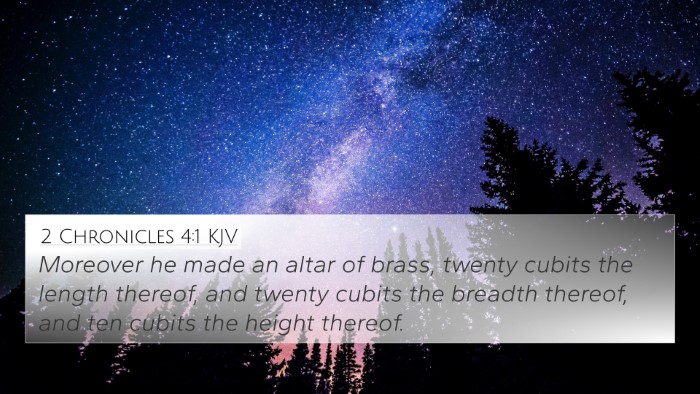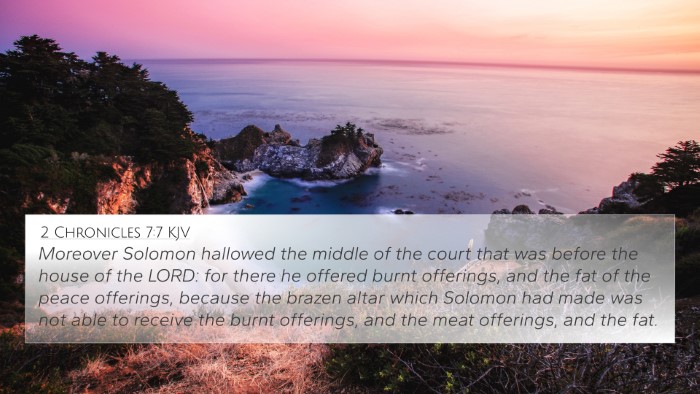Understanding 1 Kings 8:64
1 Kings 8:64 states: "The same day did the king hallow the middle of the court that was before the house of the LORD: for there he offered burnt offerings, and meat offerings, and the fat of the peace offerings, because the brazen altar that was before the LORD was too little to receive the burnt offerings, and meat offerings, and the fat of the peace offerings." This verse is significant as it highlights the dedication of the temple in Jerusalem and showcases Solomon’s devotion to the Lord.
Summary of Key Points
- Significance of Temple Dedication: This event represents a monumental moment in the history of Israel, marking the formal establishment of the temple as a place of worship and sacrifice.
- Nature of Offerings: The different types of offerings mentioned (burnt offerings, meat offerings, peace offerings) indicate the various ways in which the Israelites worshipped and sought favor from God.
- God's Presence: The act of consecrating the middle of the court symbolizes God's presence among His people, as the temple is the focal point of divine worship.
- Solomon's Leadership: Solomon's actions denote his role as a leader who prioritizes worship and obedience to God, setting an example for the nation of Israel.
Commentary Insights
Matthew Henry notes that Solomon's worship reflects the grandeur of the temple. The offerings were not merely ritualistic; they were an expression of gratitude and dedication to God, demonstrating Solomon's priorities as the newly established king.
Albert Barnes emphasizes the collective aspect of worship as all Israel gathers, symbolizing unity in faith. He also points out that the brazen altar being "too little" signifies the overwhelming nature of God's blessing, demanding greater offerings than previously envisioned.
Adam Clarke elaborates on the types of offerings and their meanings. He indicates that burnt offerings symbolize total surrender to God, meat offerings express thanksgiving, and peace offerings signify fellowship with God. Each offering has a purpose and illustrates a deeper relationship between God and His people.
Bible Cross-References
1 Kings 8:64 connects with several other Bible verses, enhancing our understanding of its context and significance:
- 2 Chronicles 7:5: This passage parallels the dedication of the temple and highlights the massive scale of sacrifices made during this event.
- Exodus 29:38-46: These verses outline the procedures for daily offerings, providing insight into the sacrificial system in the temple.
- Leviticus 1:1-17: This chapter details the nature of burnt offerings, underscoring the significance of Solomon’s acts of worship.
- Psalms 122:1: Reflecting the joy of gathering in the house of the Lord, this verse aligns with the communal aspect of Solomon’s temple dedication.
- 1 Samuel 15:22: This verse underscores the importance of obedience to God over sacrifice, which emphasizes Solomon’s intention behind the sacrifices.
- Hebrews 9:24-28: This New Testament passage connects the old sacrificial system to Christ, showing the ultimate fulfillment of temple worship in Jesus.
- Matthew 21:12-13: Jesus' cleansing of the temple serves as a bridge connecting the old testament understanding of the temple to the new covenant.
Thematic Bible Verse Connections
1 Kings 8:64 fits into several thematic discussions throughout the Bible:
- Role of the Temple: The temple as a place of divine habitation runs throughout Scripture, from the Tabernacle in Exodus to the final temple in Revelation 21:22.
- Worship and Sacrifice: The biblical theme of worship involving sacrifices can be traced from Genesis through the New Testament, culminating in Christ’s ultimate sacrifice (Hebrews 10:10).
- Leadership and Obedience: Solomon's leadership serves as an example and warning, detailing the highs and lows of following God throughout the kings of Israel.
Conclusion
1 Kings 8:64 serves as a crucial scripture in the narrative of Israel's worship and relationship with God. It encapsulates Solomon's dedication, the significance of offerings, and the communal aspect of worship. Cross-referencing this passage with related verses deepens our understanding and reveals the interconnectedness of biblical themes regarding worship, leadership, and God's enduring presence among His people.
